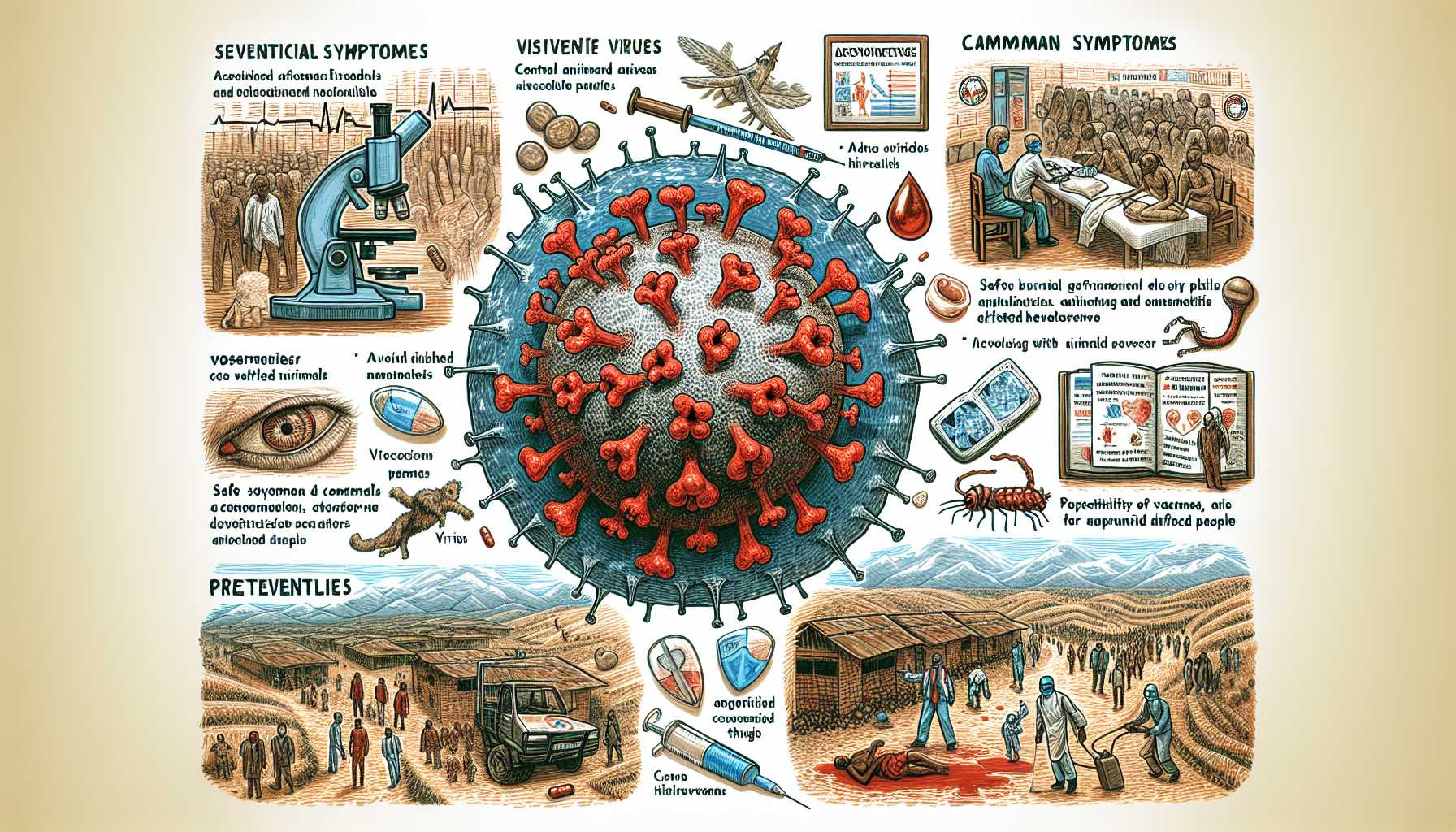
Understanding Ebola Virus Disease Symptoms and Prevention
Ebola virus disease is a severe and often fatal illness caused by the Ebola virus, which is transmitted to humans from wild animals and spreads through direct contact with infected bodily fluids.
Àibólā bìngdú bìng shì yī zhǒng yánzhòng qiě wǎngwǎng zhìmìng de jíbìng, yóu Àibólā bìngdú yǐnqǐ, gāi bìngdú tōngguò yǔ shòu gǎnrǎn de dòngwù de zhíjiē jiēchù zhuànbò gěi rénlèi, bìng tōngguò yǔ shòu gǎnrǎn de tǐyè zhíjiē jiēchù zhuànbò.
埃博拉病毒病是一种严重且往往致命的疾病,由埃博拉病毒引起,该病毒通过与受感染的动物的直接接触传播给人类,并通过与受感染的体液直接接触传播。
Symptoms typically appear 2 to 21 days after exposure and may include fever, severe headache, muscle pain, weakness, fatigue, diarrhea, vomiting, abdominal pain, and unexplained hemorrhaging.
Zhèngzhuàng tōngcháng zài bàolù hòu 2 dào 21 tiān chūxiàn, kěnéng bāokuò fārè, jùliè tóutòng, jīròu téngtòng, xūruò, píláo, fùxiè, ǒutù, fùtòng hé wúfǎ jiěshì de chūxuè.
症状通常在暴露后2到21天出现,可能包括发热、剧烈头痛、肌肉疼痛、虚弱、疲劳、腹泻、呕吐、腹痛和无法解释的出血。
The disease has a high mortality rate, and outbreaks can occur in sporadic episodes in certain regions, notably in Central and West Africa.
Zhè zhǒng jíbìng de sǐwáng lǜ hěn gāo, yìqíng kěyǐ zài mǒuxiē dìqū ǒufā, tèbié shì zài Zhōngfēi hé Xīfēi dìqū.
这种疾病的死亡率很高,疫情可以在某些地区偶发,特别是在中非和西非地区。
Diagnosis is challenging due to the similarity of symptoms to other diseases, requiring laboratory tests to confirm the presence of the virus.
Yóuyú zhèngzhuàng yǔ qítā jíbìng de xiāngsìxìng, zhěnduàn jùyǒu tiǎozhàn xìng, xūyào shíyànshì jiǎncè lái quèrèn bìngdú de cúnzài.
由于症状与其他疾病的相似性,诊断具有挑战性,需要实验室检测来确认病毒的存在。
Early supportive care—including rehydration and symptomatic treatment—can improve survival rates.
Zǎoqī de zhīchí xìng hùlǐ——bāokuò bǔyè hé duìzhèng zhìliáo——kěyǐ tígāo shēngcún lǜ.
早期的支持性护理——包括补液和对症治疗——可以提高生存率。
Preventive measures include avoiding contact with infected individuals, safe burial practices, and minimizing exposure to potentially infected wildlife.
Yùfáng cuòshī bāokuò bìmiǎn yǔ gǎnrǎn gètǐ jiēchù, ānquán máizàng zuòfǎ, yǐjí jǐnliàng jiānsuǒ yǔ kěnéng gǎnrǎn de yěshēng dòngwù jiēchù.
预防措施包括避免与感染个体接触、安全埋葬做法,以及尽量减少与可能感染的野生动物接触。
Effective vaccines and treatments are being developed to enhance future responses to outbreaks.
Y有效 de yìmiáo hé zhìliáo zhèngzài yánfā, yǐ zēngqiáng wèilái duì yìqíng de xiǎngyìng.
有效的疫苗和治疗正在研发,以增强未来对疫情的响应。
Public health strategies focus on controlling outbreaks and preparing for potential future incidents, emphasizing the importance of surveillance, community engagement, and rapid response to new cases.
Gōnggòng wèishēng cèlüè cèzhòng yú kòngzhì yìqíng hé wèi qiánzài de wèilái shìjiàn zuò hǎo zhǔnbèi, qiángdiào jiāncè, shèqū cānyù hé duì xīn bìnglì de kuàisù fǎnyìng de zhòngyàoxìng.
公共卫生策略侧重于控制疫情和为潜在的未来事件做好准备,强调监测、社区参与和对新病例的快速反应的的重要性。
Awareness and understanding of Ebola virus disease are crucial for prevention and management, particularly in regions where the virus is endemic.
Yìshí hé lǐjiě Àibólā bìngdú bìng duì yùfáng hé guǎnlǐ zhìguān zhòngyào, yóuqí shì zài bìngdú dìfāngxìng liúxíng de dìqū.
意识和理解埃博拉病毒病对预防和管理至关重要,尤其是在病毒地方性流行的地区。
Based on this article
